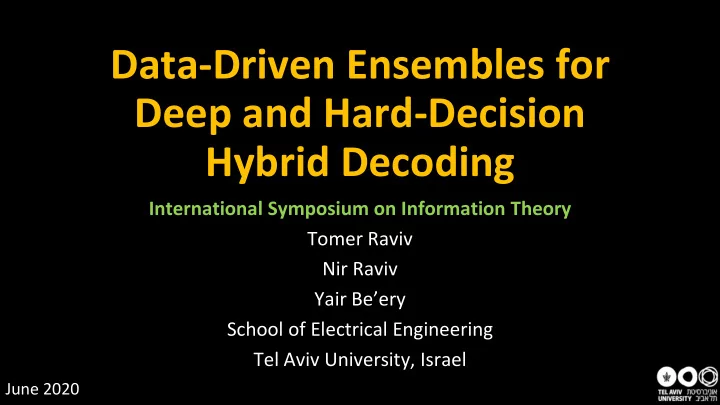

Introduction Introduction Introduction Data-Driven Ensembles for Deep and Hard-Decision Hybrid Decoding International Symposium on Information Theory Tomer Raviv Nir Raviv Yair Be’ery School of Electrical Engineering Tel Aviv University, Israel June 2020
Outline I. Background II. On the Importance of Data III. Data-Driven Ensembles IV. Summary
Outline I. Background II. On the Importance of Data III. Data-Driven Ensembles IV. Summary
Error Correction Codes Error Correction Codes increases reliability of transmission by redundancy Assumptions Linear Codes AWGN channel Galois Field - GF(2) Encoding
Simplified Communication System
Parity Check Matrix Property of linear codes Known as parity check matrix Size Each row corresponds to a check constraint Each column to a variable
• Tanner Graph [1] Urbanke and Richardson ,“Modern Coding Theory” , 2008
Belief Propagation [2] Judea Pearl , “ Probabilistic reasoning in intelligent systems: networks of plausible inference ” , 1988
Belief Propagation [2] Judea Pearl , “ Probabilistic reasoning in intelligent systems: networks of plausible inference ” , 1988
Belief Propagation [2] Judea Pearl , “ Probabilistic reasoning in intelligent systems: networks of plausible inference ” , 1988
Belief Propagation [2] Judea Pearl , “ Probabilistic reasoning in intelligent systems: networks of plausible inference ” , 1988
Belief Propagation [2] Judea Pearl , “ Probabilistic reasoning in intelligent systems: networks of plausible inference ” , 1988
Belief Propagation [2] Judea Pearl , “ Probabilistic reasoning in intelligent systems: networks of plausible inference ” , 1988
Belief Propagation [2] Judea Pearl , “ Probabilistic reasoning in intelligent systems: networks of plausible inference ” , 1988
Belief Propagation [2] Judea Pearl , “ Probabilistic reasoning in intelligent systems: networks of plausible inference ” , 1988
Belief Propagation Hard decision rule: [2] Judea Pearl , “ Probabilistic reasoning in intelligent systems: networks of plausible inference ” , 1988
Suboptimal Performance Cycles degrade performance of BP… How to compensate for cycles?
Suboptimal Performance Cycles degrade performance of BP… How to compensate for cycles? Deep learning!
Weighted Belief Propagation Deep learning • Assign weights over the edges • Choose appropriate loss • Apply SGD Intuition Adjusting the weights compensates for small cycles [3] Nachmani et al. , “Learning to Decode Linear Codes Using Deep Learning”, Sep 16
WBP [3] Nachmani et al. , “Learning to Decode Linear Codes Using Deep Learning”, Sep 16
WBP Binary cross entropy multiloss: The BP and channel exhibit symmetry Training is done with zero codeword [3] Nachmani et al. , “Learning to Decode Linear Codes Using Deep Learning”, Sep 16
Outline I. Background II. On the Importance of Data III. Data-Driven Ensembles IV. Summary
ML Model Selection in Decoding • Incorporating domain knowledge into model • Constraints-free model
ML Model Selection in Decoding • Incorporating domain knowledge into model Choice of hypothesis class Learnable parameters assignment
ML Model Selection in Decoding • Constraints-free model Choice of any state-of-the-art architecture Less limitations on solution space [4 ] Tobias Gruber et al. “On deep learning - based channel decoding”. In: 51st Annual Conference on Information Sciences and Systems (CISS). 2017.
ML Model Selection in Decoding Currently, the model based approach dominates Curse of dimensionality Yet, the model isn’t all…
Data Importance in Deep Learning Training data is core in DL Not fully understood
Data Distinction Classical ML Decoding ML • Limited amount • Unlimited amount • Distribution is unknown • Distribution is specified by channel
Outline I. Background II. On the Importance of Data III. Data-Driven Ensembles IV. Summary
Ensembles A single decoder is limited.. Combination of decoders is superior Divide and conquer principle [5] Lior Rokach , “Pattern Classification using Ensemble Methods”, 2010
Ensembles for Decoding List-decoding is suboptimal ”there exists no clear evidence on which graph permutation performs best for a given input” [6] Elkelesh et al., “Belief Propagation List Decoding of Polar Codes”, 2018
Ensembles for Decoding Key points decoding performance complexity [6] Elkelesh et al., “Belief Propagation List Decoding of Polar Codes”, 2018
Data-Driven Ensemble
Data Specialized Decoders Based on Hamming distance Error pattern computation Region assignment Match to dataset Train on Based on syndrome ( won’t have time to cover)…
Gating Function Classical hard decision decoder (HDD) Outputs , calculate Gating types single-choice gating - for realizing all decoders gating - random-choice gating - randomly
Combiner Likelihood-maximizing function [7]: [7] Ralf Koetter et al., “Characterizations of pseudo -codewords of (low- density) parity check codes”, 2007
Experimental Results Results for BCH(63,45): CR-BCH(63,36) Code Waterfall - 0.3dB FER gain Error-floor – 1.25dB FER gain Compared to best previous results [8] 3-decoders [8] Ishay Be’ery et al., "Active Deep Decoding of Linear Codes," in IEEE Transactions on Communications, Feb. 2020.
Experimental Results Results for BCH(63,45): CR-BCH(63,45) Code Waterfall - 0.3dB FER gain Error-floor – 1dB FER gain Compared to best previous results [8] 3-decoders [8] Ishay Be’ery et al., "Active Deep Decoding of Linear Codes," in IEEE Transactions on Communications, Feb. 2020.
Outline I. Background II. On the Importance of Data III. Data-Driven Ensembles IV. Summary
Summary Domain knowledge is vital for ML in communication Data is important as the algorithm (!) How to effectively and efficiently utilize data is still insufficiently researched
Bibliography [1] Urbanke and Richardson ,“Modern Coding Theory” , 2008 [2] Judea Pearl , “ Probabilistic reasoning in intelligent systems: networks of plausible inference ” , 1988 [3] Nachmani et al. , “Learning to Decode Linear Codes Using Deep Learning”, Sep 16 [4 ] Tobias Gruber et al. “On deep learning - based channel decoding”. In: 51st Annual Conference on Information Sciences and Systems (CISS). 2017. [5] Lior Rokach , “Pattern Classification using Ensemble Methods”, 2010 [6] Elkelesh et al., “Belief Propagation List Decoding of Polar Codes”, 2018 [7] Ralf Koetter et al., “Characterizations of pseudo -codewords of (low- density) parity check codes”, 2007 [8] Ishay Be’ery et al., "Active Deep Decoding of Linear Codes," in IEEE Transactions on Communications, Feb. 2020.
Recommend
More recommend